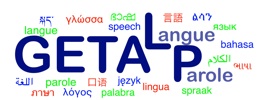Voici l'ensemble de la production scientifique de l'équipe GETALP (Groupe d’Étude en Traduction Automatique/Traitement Automatisé des Langues et de la Parole), qui fait partie de l'axe de recherche "Traitement de Données et de Connaissances à Grande Echelle" au sein du LIG, Laboratoire d'Informatique de Grenoble.
En bref
L'équipe GETALP (Groupe d'Étude en Traduction Automatique/<b<Traitement Automatisé des Langues et de la Parole) est née en 2007 lors de la création du LIG.
Issue de l'union vertueuse de chercheurs en traitement de l'écrit et de la parole, le GETALP est une équipe pluridisciplinaire (informaticiens, linguistes, phonéticiens, traducteurs et traiteurs de signaux, ...) dont l'objectif est d'aborder tous les aspects théoriques, méthodologiques et pratiques de la communication et du traitement de l'information multilingue (écrite ou orale).
La méthodologie de travail du GETALP s’appuie sur des allers-retours continus entre collectes de données, investigations fondamentales, développement de systèmes opérationnels, applications et évaluations expérimentales.
Points saillants
Approche écologique : une des spécificités du GETALP est sa volonté de se confronter à la diversité des situations d'usage de la langue écrite ou parlée : multiplicité des langues, des locuteurs, des dialectes, des cultures, des contextes sociaux ou applicatifs ; avec une disposition particulière pour les « longues traines » (langues peu dotées, locuteurs atypiques, ...).
Démarche agnostique : l'histoire de l'équipe, et les cultures scientifiques diverses qui y sont rassemblées, permettent de mettre en synergie méthodes expertes et empiriques, analyse à grande échelle (big data) et analyse de phénomènes nécessitant une annotation fine (beautiful data), modèles et induction, etc.
Pluridisciplinarité : la dynamique de l'équipe GETALP est liée en partie à la complémentarité de ses membres, permettant une approche « en largeur », de la collecte de ressources à l'évaluation de systèmes ; de la compréhension de phénomènes communicatifs aux applications industrielles.
Avec l'humain au centre : pour assister l'humain dans des situations de communication et d'interaction, il est nécessaire de l'inclure dans les processus automatisés (approches semi-supervisées, interactives, collaboratives, analyse de traces et d'erreurs des systèmes).
Production d'outils et de ressources : le GETALP développe et distribue librement des outils et des ressources (plate-forme Web de développement coopératif de bases lexicales multilingues, collecte de corpus écrits et oraux pour le traitement des langues peu dotées, collecte de corpus multimodaux dans des contextes d’interaction, système collaboratif de post-édition et d'évaluation de traductions automatiques, services web pour la langue, etc.).
Axes de recherche
Nous listons ci-dessous les axes de recherche « phares » et « en devenir » du GETALP. Ils trouvent des applications directes dans des domaines divers tels que la recherche d'information, la robotique, les technologies d'assistance à la personne, l'apprentissage des langues.
- Traduction et transcription automatiques de la parole
- Traduction assistée par ordinateur
- Traitement des langues peu dotées
- Traitement / Analyse de la parole et interactions dans les environnements ambiants
- Modélisation des affects sociaux
- Collecte et interopérabilité des ressources lexicales multilingues
- Processus automatiques et interactifs de clarification du sens
- Génie logiciel du multilinguisme
- Résumé automatique de données ambiantes
Ecosystème local, national et international
Le GETALP bénéficie d'un écosystème local riche et collabore avec d'autres équipes du LIG (en liaison avec les applications mentionnées ci-dessus) et avec d'autres laboratoires grenoblois. Au niveau national et international, le GETALP est un acteur reconnu de la communauté de recherche en traitement des langues naturelles et de la parole (nombreux projets collaboratifs et industriels, organisation en 2012 de JEP-TALN-RECITAL, etc.). Enfin, un point remarquable est son réseau international de collaborations et de contacts sur tous les continents, qui fait du GETALP un acteur de terrain particulièrement pertinent et crédible pour contribuer au Graal théorique et technologique du multilinguisme.
L'équipe GETALP est issue des équipe GEOD et GETA du laboratoire CLIPS et s'inscrit dans une longue histoire.
Site web de l'équipe GETALP
Site web du LIG

